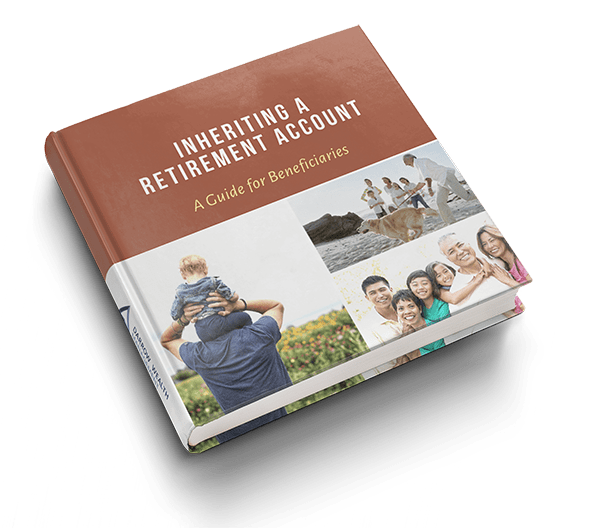Updated for 2024. If a loved one has passed and you’re expecting to receive an inheritance, you may have a number of questions about the process; such as is an inheritance taxable and what to do after receiving an inheritance. Whether an inheritance is taxable to you, the beneficiary, will depend on what type of asset you inherited. Determining the best use of inherited funds requires financial planning. You’ll want to evaluate your goals, priorities, and analyze possible trade-offs. Here’s what to do after receiving an inheritance.
Settling an estate
The process and timeframe for settling your loved one’s estate (the decedent’s) will depend on the complexity and organization of their affairs. An estate consists of all assets in which the individual had ownership interests, including financial accounts (retirement, banking, brokerage, etc.), real estate, personal assets, life insurance proceeds, businesses, and so on. These assets are then reduced by the decedent’s share of outstanding debt, such as a mortgage.
A complete inventory of all these assets can take some time in a complex estate. Beneficiaries typically don’t receive distributions until probate is complete and outstanding obligations are paid off.
3 Things You Need to Know About Your Parent’s Estate Plan
The probate process
Probate is a legal process where certain assets in the decedent’s estate that were owned as an individual are distributed by the court. How does the court decide who gets what? If there was a will, that will help.
If the decedent did not have a will, then the court decides. For more on probate, read 4 Reasons to Avoid Probate.
Does an inheritance go through probate?
Certain types of assets will not enter the probate process regardless of whether there was a will in place.
- Beneficiary designations. Assuming the decedent has made beneficiary designations, accounts like IRAs, 401(k)s, and life insurance policies bypass probate.
- Trusts. Trusts will also bypass probate, which is a primary reason to use a trust. If the decedent established a revocable or living trust during their lifetime, or the estate plan details that certain assets will pass to newly created trusts upon death, these assets may not be subject to probate. A wide range of assets can be put in trust. Common examples include real estate, art, cash, investment accounts, and so on.
- Titling. Assets owned jointly, often by marriage, may pass to the spouse and avoid probate. States have different rules about ownership, so it depends on the state you live in and the physical location of the assets.
If an inheritance does not fit these criteria, then it will likely pass through probate. Remember, having a will does not mean assets will avoid probate. A will is essentially a legal record of the decedent’s wishes which the court will consider during probate.
Is an inheritance taxable? The 5 different types of tax that could apply to your inheritance.
Inheriting a Trust Fund: Distributions to Beneficiaries
What to do after receiving an inheritance
Depending on your goals and what type of asset you inherited, your options may vary. For example, if cash or stock was put in a trust for your benefit, the deceased may have stipulated the timing of distributions. Assets inherited through a trust may not have the same options as a cash inheritance or assets that can be easily liquidated for cash. To discuss what to do with your inheritance, please contact us directly.
Inheriting a home or other personal property
An inheritance or unexpected windfall can sometimes stir mixed emotions, particularly when the inherited asset is a home. With an inherited home or other real property owned by the decedent, there’s often an added level of complexity and nostalgia that typically isn’t found with cash inheritances.
At times, a beneficiary may put themselves in a strained financial position in an effort to keep an inherited family home, especially when it requires buying out co-beneficiaries (often siblings).
Before letting emotions drive the strategy, try to take a more objective look at the situation. Assess your means and the impact it may have on your other goals. Keep in mind the intent of your loved one also. They probably did not wish to cause you stress with this gesture, delay your retirement, or raid Junior’s college fund.
What to Do When a Parent Dies and You’re the Executor
Inheriting an IRA or retirement account
The options will depend on whether the deceased was your spouse or a parent or relative. Spouses will have more flexibility than non-spouses. Starting in 2020, most non-spouses need to take all the funds they inherited in a retirement account in 10 years, potentially earlier.
The rules for inherited IRAs differ from inherited 401(k), 403(b) plans, or other types of employer-sponsored retirement plans as plan-specific rules may come into play. For example, beneficiaries of a traditional IRA cannot convert the account to a Roth IRA, but beneficiaries of a traditional 401(k) typically can.
Inheriting cash or stocks in a brokerage account or trust fund
Inheriting cash or another liquid investment like a brokerage account outright (e.g. not in trust) can provide a lot of flexibility for a beneficiary, including potentially significant tax benefits. Although the windfall may not be enough to fully fund all of your goals, it could be a helpful jumpstart.
Inheritances left in a trust fund often have additional restrictions, so it’s important to work with a financial advisor and estate planning attorney to understand what it means for you.
What should I do with the money I’m about to inherit?
There may be a temptation to spend an inheritance on a new home or lifestyle expenses instead of saving and investing for larger financial goals. If you’ve inherited single stocks, you may feel nostalgic about certain inherited securities and reluctant to sell them. Single stocks carry a much greater investment risk than a diversified portfolio would, so balancing risk tolerance with your emotions and overall investment management strategy is important.
When deciding what to do with an inheritance or windfall, consider working with a financial advisor who can help you objectively evaluate your options and also understand the emotional dynamic involved. When we develop a financial plan for our clients, we combine all the pieces of their financial and life situation to create one cohesive view. Using income, fixed expenses and other discretionary spending data, we are able to project clients’ cash flows.
Through modeling, we can help you prioritize goals and evaluate trade-offs through what-if scenarios, a timeline, and funding projections. Instead of going it blind, you can make an informed decision based on actionable data.
Managing sudden inherited wealth
If you’re receiving an inheritance, discuss your options with us. Darrow Wealth Management is a fee-only wealth management firm and fiduciary specializing in helping individuals who experience a large windfall from an inheritance. If you have questions about managing inherited wealth, schedule a call with a Darrow Wealth Advisor today.
For more information on what to do after receiving an inheritance, contact us today to schedule a consultation.
Last reviewed May 2024










